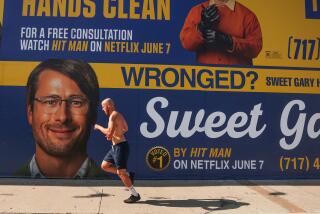Groups Ask Action on Product Placements : Movies: FTC is asked to force filmmakers to inform movie patrons about plugs for brand names in films.
- Share via
WASHINGTON — Several public interest groups petitioned the Federal Trade Commission Thursday to force filmmakers to tell theater patrons before a movie is shown that it includes paid product placements.
“In this way, audiences will be alerted to the fact that those bright products serve no artistic purpose, but are in the movie simply to be advertised,” Mark Crispin Miller, a co-signer of the petition, said at a news conference.
Miller, a professor of media studies at Johns Hopkins University, said highlighting products in movies had grown significantly, and the notice would let filmgoers know “they’re going to be hit with paid advertising.” The notice should be “clearly displayed” on the screen and “clearly audible.”
The petition, filed by the Center for the Study of Commercialism, the Consumer Federation of America and other groups also asked the FTC to investigate what they called the widespread advertising in five recent top box-office hits:
* “Ghost,” from Paramount, which CPC said contained at least 23 references to 16 different brand-name products.
* Disney’s “Pretty Woman,” which CPC said contained 20 references to 18 brand-name products.
* “Home Alone,” 20th Century Fox’s box office blockbuster. CPC said it contained 42 references to 31 brand names.
* “Teenage Mutant Ninja Turtles” from New Line Cinema, which CPC said contained 18 brand names.
* Tri-Star’s “Total Recall,” which starred Arnold Schwarzenegger. CPC said that film contained at least 55 references to 28 brand-name products.
Michael Jacobsen, a member of the center’s staff, told a news conference that none of the companies responded when asked by the CPC whether there were paid product placements in the films.
Jacobsen said the petitioning groups did not ask that advertising be banned in movies, but only that the viewer be told of it.
“What we’re saying is don’t try to pretend you’re showing them art when what you’re showing is advertising,” said Jacobsen. Handing a name-brand product to the leading character in a popular movie “is an effective form of advertising because it’s a sneaky form of advertising,” Jacobsen said.
“Product placement is a powerful--and deceitful--advertising technique, because consumers aren’t told they (are) being advertised to,” he said.
With the cost of blockbuster movies in the tens of millions of dollars, Hollywood studios and producers are looking for ways to help pay for the spectacular special effects that viewers expect and the high salaries actors demand.
“Product placement is crucial to the film industry in a lot of ways,” conceded Jacobsen. And he reiterated that CPC is not advocating removing the plugs, just telling patrons ahead of time that they’re there.
“The effectiveness of these plugs lie in the fact that people don’t see them as plugs,” he said.
But a spokesman for the American Assn. of Advertising Agencies said product placements are “scattered” and “in terms of dollars not a very big business.”
The spokesman, John Kamp, said when advertising agencies looked at the area, “it didn’t turn out to be an issue that was big enough that anyone cared about it as a business.”
Jacobsen said he was “confident the FTC will take some kind of action,” noting that in the past hard guidelines to newspapers to make sure advertising that resembled editorial content was accompanied by the word “advertisement.”
More to Read
The biggest entertainment stories
Get our big stories about Hollywood, film, television, music, arts, culture and more right in your inbox as soon as they publish.
You may occasionally receive promotional content from the Los Angeles Times.










